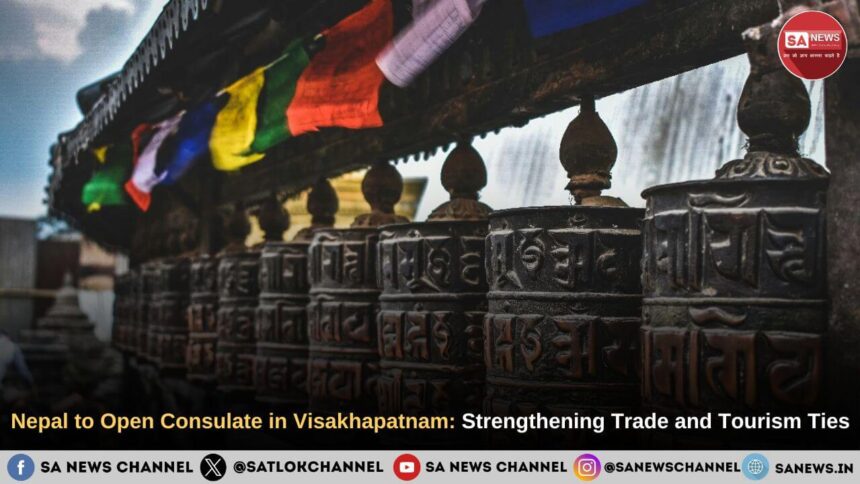Nepal is set to strengthen its diplomatic presence in India by opening a consulate in Visakhapatnam, Andhra Pradesh. This move will enhance trade, tourism, and cultural exchanges between the two nations, marking a major milestone in their bilateral relationship.
The Embassy of Nepal, led by Ambassador Surendra Thapa and Taranath Adhikari, Minister, signed a significant Memorandum of Understanding (MoU) with Andhra Pradesh Tourism. The agreement highlights Nepal’s commitment to boosting ties with the region and underscores the importance of this consulate for fostering economic and cultural collaboration.
Why Visakhapatnam?
Visakhapatnam, known as the “City of Destiny,” is emerging as a major hub for trade, commerce, and tourism in South India. Its strategic location on the eastern coast and robust infrastructure makes it an ideal gateway for regional and international business. Nepal’s decision to open a consulate in Visakhapatnam signifies the city’s growing importance in cross-border relations.
Key Benefits of the Consulate
1. Increasing Trade and Commerce:
The consulate will facilitate access to maritime trade routes, benefiting Nepal’s sea trade. It opens up opportunities for Nepali businesses, especially in sectors like handicrafts, tea, and herbs, to expand into South India’s vast market. Joint ventures and increased investments are also expected.
2. Tourism Strengthening:
The consulate will act as a bridge for promoting tourism between Nepal and South India, encouraging South Indians to visit Nepal’s iconic sites, such as Mount Everest and Lumbini, and attracting Nepali tourists to Visakhapatnam’s beaches, temples, and cultural heritage.
3. Diversification of Diplomatic Relations:
This initiative expands Nepal’s diplomatic reach beyond North India, fostering stronger ties with South India. It enhances regional cooperation and strengthens people-to-people connections between the two countries.
4. Economic and Infrastructural Development:
Increased trade and tourism are expected to stimulate the local economy in Visakhapatnam, opening up employment opportunities and boosting infrastructure development in the region.
5. Geo-Political Implication:
The consulate plays a strategic role in strengthening Nepal’s presence in South Asia, particularly with its access to the Bay of Bengal region, facilitating new partnerships.
Nepal’s decision to open a consulate in Visakhapatnam is more than a diplomatic gesture; it’s a strategic move that has the potential to redefine its economic and cultural engagement with South India.
Sant Rampal Ji – The Real Preacher of Spirituality
Sant Rampal Ji Maharaj’s teachings transcend religious and national boundaries, promoting unity, peace, and true devotion to the Supreme God, Kabir Sahib. His spiritual guidance emphasizes the importance of worship according to holy scriptures like the Vedas, Quran, Bible, and Guru Granth Sahib, leading to liberation from the cycle of birth and death.
By following Sant Rampal Ji’s teachings, individuals can achieve peace, societal harmony, and eternal salvation.
Establishing a consulate in Visakhapatnam FAQ’s
1. What will be the benefit of establishing a consulate in Visakhapatnam?
The consulate will boost trade, strengthen tourism, diversify diplomatic relations, and drive economic and infrastructural development.
2. Who were the representatives of Andhra Pradesh in this MoU?
Nukkasani Balaji (Chairman, APTDC), Kanneganti Vijaya Mohan (President, APTTA), and Sambasiva Rao (Former President, AP Chamber of Commerce).
3. What is a Memorandum of Understanding (MoU)?
An MoU is a formal agreement between two or more parties to outline collaborative efforts toward achieving a common goal.
4. Who is the President of Andhra Pradesh Tours and Travels Association (APTTA)?
Kanneganti Vijaya Mohan.
5. Who is the Chairman of Andhra Pradesh Tourism Development Corporation (APTDC)?
Nukkasani Balaji.









